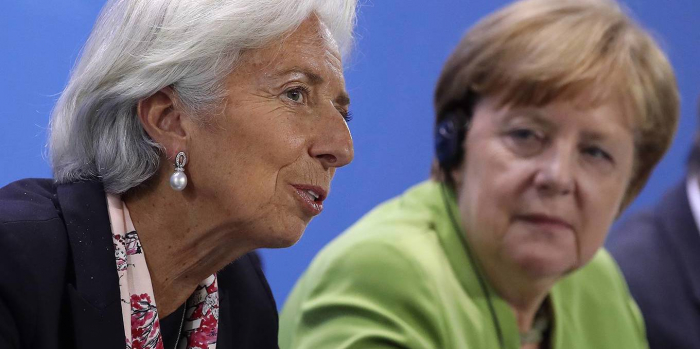How can the eurozone get the fiscal stimulus it needs, and which European Central Bank President Christine Lagarde is urging, in the face of the refusal by some countries, starting with Germany, to run budget deficits? There is a good answer, but it doesn't involve attempting to cicumvent the intent of the ECB's statute.
The eurozone is in a bind. Despite successive doses of monetary stimulus by the European Central Bank, inflation remains stubbornly below target. Conventional monetary policy and even quantitative easing evidently have limited potency when interest rates are at or near zero.
Monetary skeptics worry, moreover, that lowering rates further will damage Europe’s banks. Additional asset purchases beyond the monthly level of €20 billion ($22 billion) already agreed, they warn, will impair the liquidity of financial markets. By pushing up asset prices, the ECB could expose the financial system to stability risks when those lofty prices return to earth.
The obvious event precipitating this return would be a recession. And when this downturn materializes, the ECB will have limited room for offsetting action, again because interest rates are already low.
The solution to this conundrum suggested by ECB President Christine Lagarde is greater reliance on fiscal policy. By purchasing government bonds bearing negative interest rates, investors are literally begging European governments to borrow. So long as growth rates remain stuck at low levels because of anemic private spending, a bit of additional public spending is just what the doctor ordered. If the economy nonetheless sinks into recession, fiscal stimulus can be ramped up still further.
The problem is that national policymakers in a number of eurozone countries, starting with Germany, are dead set against fiscal expansion. Believing that they are being asked to encumber their children with debt in order to provide the stimulus that countries like Italy are unable to deliver, they happily invoke the EU’s fiscal rules to justify not running budget deficits.
This impasse has prompted suggestions that the ECB should pursue fiscal policy by stealth. For example, it could adopt a policy of dual interest rates. It could pay positive rates when taking deposits from commercial banks, cushioning the banks’ profitability. It could then lend to those same banks at sharply negative rates, giving them money on such concessional terms that they would find lending it irresistible. The ECB has experimented with these policies on a small scale under its so-called TLTRO-II program.
But by expanding a policy under which it paid more on its liabilities than it charged on its assets, the ECB would incur losses and erode its capital. To be sure, central banks can operate with negative capital, financing themselves by printing money. But the longer they do so, the more observers, anticipating ongoing money creation, will come to doubt the credibility of monetary policy. The ECB’s shareholders, meaning European governments, might then feel compelled to recapitalize it – at a significant cost to themselves.
Critics in Germany and elsewhere will therefore challenge the legality of such policies, citing the strict separation between monetary and fiscal policy in the European treaties. One response is: who cares? Treaty provisions can be creatively reinterpreted when exigent circumstances require. This has happened more than once in the euro’s two decades.
But the legitimacy of the ECB depends on more than legal formalities. Fundamentally, it derives from public support. And public opinion toward quasi-fiscal measures by the ECB would be strongly negative in countries like Germany. The German government, channeling this popular indignation, could protest in a variety of ways, such as refusing to participate in EU decision-making processes requiring unanimous consent. Anyone familiar with the “empty chair crisis” of 1965, when France refused to occupy its seat in the Council of Ministers over a dispute about the Common Agricultural Policy, will appreciate how disruptive such a protest can be.
Rather than attempting to circumvent the intent of the ECB’s statute, the resources of the European Investment Bank should be enlisted. The EIB has €70 billion of paid-in capital and reserves and €222 billion of callable capital. It has a board of directors from all 28 EU member states, limiting the danger of capture. Its charge is to fund sustainable investment projects, and it is empowered to borrow for that purpose. Because it is required to place its bonds with private investors, it is subject to market discipline, and it earns positive returns on its investments. Ramping up its borrowing and spending would be entirely consistent with its mandate.
EIB lending is limited to 250% of the capital subscribed by its shareholders. To make a difference now, much less in a recession, this capacity would have to be scaled up significantly. To be sure, proposals for doing so will meet with political resistance from those who fear that a larger EIB would be a loss-making EIB. But significant losses are unlikely in an environment where borrowing costs are only a fraction of the return on equity investment.
This, in any case, is the debate Europe should be having. Tackling the stimulus issue head-on is more likely to succeed than proceeding by subterfuge.
Barry Eichengreen is Professor of Economics at the University of California, Berkeley, and a former senior policy adviser at the International Monetary Fund. His latest book is The Populist Temptation: Economic Grievance and Political Reaction in the Modern Era.
Read the original article on project-syndicate.org.
More about: Europe
















































